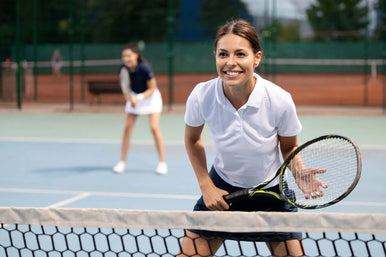

Vitamin C is renowned for its immune-boosting properties - it is our go-to for coughs and sniffles and many of us add this water-soluble vitamin to our winter wellness regime. But perhaps it’s time to look at this potent antioxidant in a new light.
Did you know that Vitamin C also has a host of benefits for our sports and fitness goals too? Here we explore exactly how this multi-talented vitamin can help you to perform at your best, whilst enhancing your immunity at the same time.
What is vitamin C?
Vitamin C can be categorised as both a vitamin and an antioxidant, as it performs both of these health-boosting roles. The body cannot generate or store its own Vitamin C therefore it is reliant on us consuming enough Vitamin C-rich foodstuffs on a daily basis.
How does vitamin C support exercise?
Vitamin C can enhance our sport and our exercise performance in a number of key ways. Firstly, whilst moderate exercise is healthy for our immune health - we can experience a temporary dip in immunity post strenuous exercise. Vitamin C can support the natural function of our immune system, making us less likely to become unwell when exposed to germs post workout. This can prevent us from missing training and affecting our fitness goals. Furthermore, Vitamin C can:
- support our absorption of iron which is required for healthy energy levels, especially in vegans and women
- reduce the stress hormone cortisol which can impede muscle growth and testosterone if elevated post-exercise
- encourage collagen production which supports tissue repair and muscle growth post-exercise.
Do athletes need more vitamin C?
When we work out, we put the body under stress - this is a good thing as it helps the body to adapt and grow stronger, however, it can create a higher level of ‘free radicals’ too. This is fine, providing we have sufficient antioxidant intake to counteract this type of stress. Helpfully, Vitamin C can do just this, which is why people who exercise extensively can benefit from ensuring they keep their levels well topped up each day.
Does exercise lower vitamin C?
Vitamin C levels can be lowered in the days following heavy exercise, as potentially the body needs to use up more of its supplies to counteract the effects of muscle damage and stress. This can lead us vulnerable to infections and can also impede our rapid muscle recovery for our next training session. Therefore, keeping levels high pre and post-exercise can encourage rapid recovery and leave us feeling ready to go again.
What does vitamin C do to muscles?
As well as supporting the collagen production required for healthy muscle function, Vitamin C also promotes the formation of carnitine - a substance used to provide fuel for our muscles during movement. It also reduces oxidative stress and micro-tears/trauma which is a natural effect of exercise - aiding better recovery and repair.
Can vitamin C deficiency affect athletic performance?
When athletes are deficient in Vitamin C, it can impact performance. This is because it can reduce the ability of our muscles to generate energy, repair any damage between training sessions, and may decrease our iron absorption leading to anaemia.
Does vitamin C help with strength?
If your goal is to gain strength, then your ability to both generate new muscle tissue and recover from muscle micro-tears is key - Vitamin C can help with both. Vitamin C has been shown to preserve muscle mass in older adults, and when combined with adequate protein intake, can keep you stronger, for longer.
When is the best time to take vitamin C?
Whilst you can take Vitamin C at any time of the day - combining it with food can promote iron absorption and reduce any gastrointestinal side effects. Additionally, if you train hard, there may be merit in supplementing pre or post-workout to aid muscle repair and boost immune function.
Overall, whether you want to build muscle mass, recover better after a run, or just aid your immune system post-swim, Vitamin C is a great asset to your health and fitness regime. A daily supplement can ensure we keep our supplies high and our bodies strong and resilient. Browse our sport-friendly selection of vitamins and minerals here.


